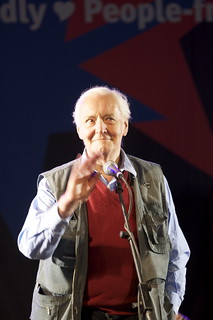Tony Benn springs to mind at the mention of the word integrity. As for 'odd', he was a bit of a political oddity having such integrity as he did. In his diaries, he describes how in the early 70s, Henry Ford, the grandson of Henry Ford I, arrived in the UK. Tony described the occasion as being like an emperor visiting a local tribal chieftain. In his role as President of the Board of Trade, Tony found he had to wrangle with the magnate's direct threat that if Britain didn't join the Common Market (now known as the EU), Ford would take his car plants out of the UK. For most politicians the answer would be a no-brainer: capitulation to the corporate bully, pocket the brown envelope, accept a premiership complete with perks and privileges, and prepare for the speech circuit of his twilight years. (He was unlikely to accept a peerage, as he'd spent much of his early career kicking his hereditary peerage into touch.) However, anyone knowing that man's strength of character can only imagine the quandary he faced at that time.
Tony expressed his view of the imbalance of corporate/people power thus. "Compared to this, the pressure brought to bear in industrial disputes by the unions is minuscule. This power was revealed even more clearly in 1976 when the IMF secured cuts in our public expenditure. These lessons led me to the conclusion that the UK is only superficially governed by MPs and the voters who elect them. Parliamentary democracy is, in truth, little more than a means of securing a periodical change in the management team, which is then allowed to preside over a system that remains in essence intact. If the British people were ever to ask themselves what power they truly enjoyed under our political system they would be amazed to discover how little it is, and some new Chartist agitation might be born and might quickly gather momentum." (Taken from Wikipedia.)
Well, as Tony well knows, that hasn't happened yet. But is it too late for democracy?
It seems the car companies are still at it. This morning the BBC tells us that, "Nissan will reconsider its investment in the UK if Britain leaves the European Union, chief executive Carlos Ghosn has told the BBC".
Mr Ghosn said, "If anything has to change, we need to reconsider our strategy and our investments for the future."
"Prime Minister David Cameron has promised a public vote on EU membership in 2017 if the Conservatives win the next general election in 2015." One might easily imagine the upshot of that piece of political theatre. Going by experience (particularly Irish), we'd be back at the polls like a yoyo on steroids until we got it right (to suit the corporate cabal). Failing that, they'd change a few words in the treaty, rename it and regurgitate it -- this time finding an excuse to bypass referendum. Then, of course, there are plenty of military options.
http://www.bbc.co.uk/news/business-24859486
As usual, the democratic aspect seems covered scantly by the BBC. However, going back to the Benn quandary. Does democracy always have to capitulate to corporate threats? The old maxim about dealing with bullies might help us with this: We have to stand up to bullies wherever possible, for when we give in to bullying it doesn't stop the bullying. It might buy temporary relief, but soon the threats are back with vengeance. Hindsight might help us realise that were we to reflect on the many difficulties we've faced since then, due to relentless Thatcherite privatisation under all political guises since, leading to outsourcing, leading to depleted tax base, the financial collapse, and the inevitable inability to recover that followed. Even medieval despots, in need of warmongering revenue, had the sense to know that "you canna tak' the breeks off a Highlander".
Tony, and a few stalwarts of true Labour, found themselves in the political wilderness from the start of the 80s as New Labour materialised out of the political swamp, bending like saplings with the politico-corporate wind. But he continued, as he still does today in his 88th year, warning the electorate of the dangers to democracy of unchallenged corporate power, particularly where EU politics are concerned.
The following quote should illustrate Tony's eloquence in defence of democracy over unelected, unaccountable power: "Capitalism and communism have one thing in common: they both absolutely detest democracy. Stalin wouldn't let anyone have any power other than his own Central Committee, and capitalism doesn't want democracy. The World Trade Organisation isn't democratic, the IMF isn't democratic, the multinationals aren't democratic, the Central Bank in Frankfurt isn't democratic, the media, Murdoch, isn't democratic; and the hostility to democracy is the characteristic of capitalism, and now communism is gone, and people see capitalism red in tooth and claw if you know what I mean, they don't like that either, and that's why the anti-globalisation movement and the peace movement are growing so strongly, because people realise that capitalism oppresses you. Look at the people dying of AIDS in Africa because they can't afford the drugs where the patents belong to rich American pharmaceutical companies, and Bush declining to help them."
To answer the question of, "Can we do it; (yes we can -- remember?)", in accordance with facing up to corporate browbeating, we might consider the contrasting post Financial Collapse (2008) circumstances of Ireland and Iceland. Many people -- those paying attention -- will know that regardless the odds against it, Iceland sacked its politicos, jailed its bankers, rewrote its constitution, and is doing very nicely, thank you, well on its way to recovery. We should note too the entirely opposite fortunes of Ireland: They have austerity compounded on austerity, compounded by interest, compounded with further interest presided over by the same politicos kowtowing to the same banking cartel still, no doubt, pulling figures out of their posteriors and ramming it down the throats of everyone else. Maybe that should help us with our democracy/oligarchy choice, were we ever to decide to make it.
Nothing worth winning was easily won, as nothing worth keeping was easily kept -- and 'beware the Greeks bearing gifts', goes the Trojan legend. Corporations might bring us jobs and lend us usurious fiat currency, but at what cost? Are we truly so inept that we must rely on such ilk as the self-professed 'creators of wealth' of which they can so easily dispossess us? Or, are we just so naive as to swallow such propaganda? If anyone knows, the Greeks know a thing or two about democracy. Now, perhaps they could tell a tale or two of how precious it is and how easy it is to lose it.






